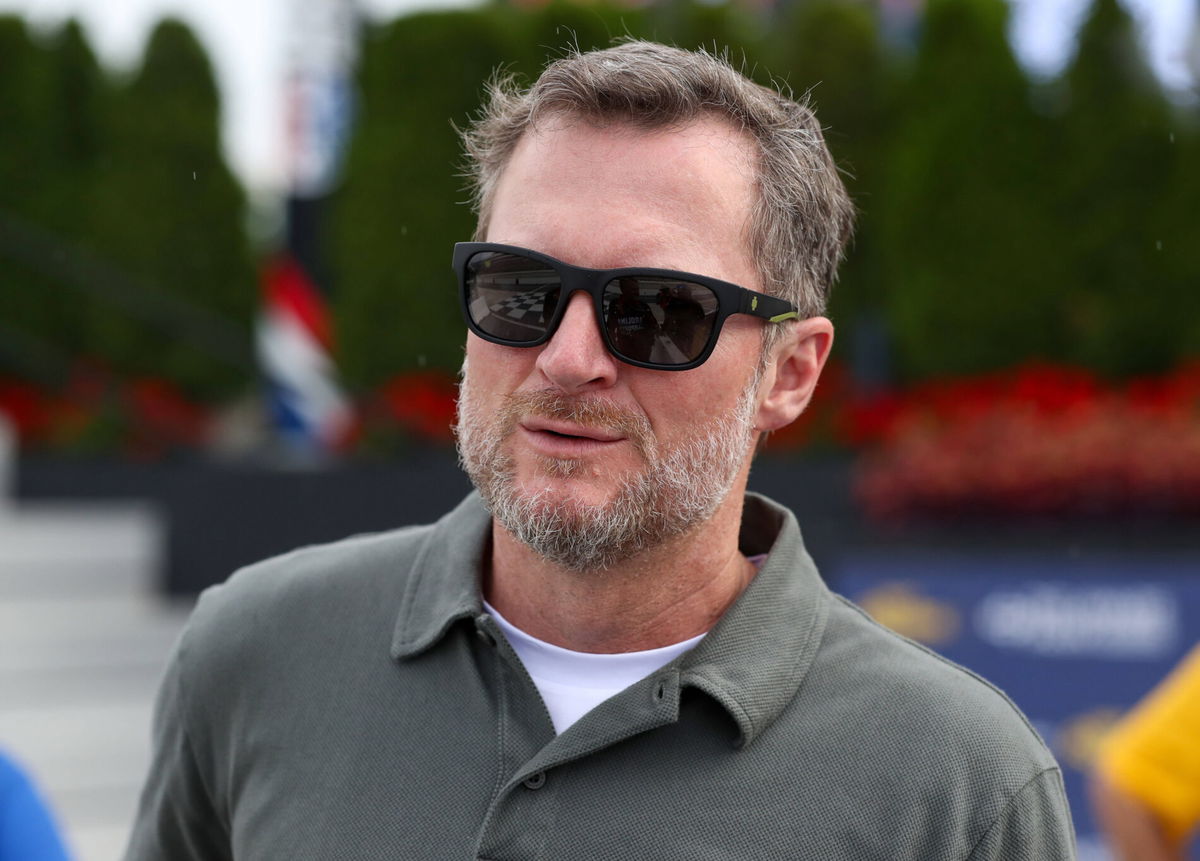
Imago
NASCAR, Motorsport, USA Xfinity: NASCAR Xfinity Series Race at Dover Jul 19, 2025 Dover, Delaware, USA NASCAR Xfinity Series owner Dale Earnhardt Jr. looks on from pit road during the BetRivers 200 at Dover Motor Speedway. Dover Dover Motor Speedway Delaware USA, EDITORIAL USE ONLY PUBLICATIONxINxGERxSUIxAUTxONLY Copyright: xMatthewxO Harenx 20250719_tcs_bm2_067

Imago
NASCAR, Motorsport, USA Xfinity: NASCAR Xfinity Series Race at Dover Jul 19, 2025 Dover, Delaware, USA NASCAR Xfinity Series owner Dale Earnhardt Jr. looks on from pit road during the BetRivers 200 at Dover Motor Speedway. Dover Dover Motor Speedway Delaware USA, EDITORIAL USE ONLY PUBLICATIONxINxGERxSUIxAUTxONLY Copyright: xMatthewxO Harenx 20250719_tcs_bm2_067
NASCAR Hall of Famer Dale Earnhardt Jr. carries unmatched weight in the garage. His insights, shaped by decades on the track, spark conversations that resonate across the sport. With NASCAR unveiling its 2026 schedule last month, new road courses like San Diego’s Naval Base Coronado have stirred debate. As the divide between ovals and road courses grows louder, Earnhardt Jr’s voice cuts through the noise.
Watch What’s Trending Now!
The 2026 schedule introduces bold changes, with road courses gaining prominence alongside traditional ovals. Jeff Gluck, a respected NASCAR insider, echoed Earnhardt’s concerns, stating, “Three or four a year is fine. I’m almost like, let’s get back to one or two at this point.” The garage remains split, with drivers and fans weighing the balance of tradition versus innovation. Earnhardt’s perspective, rooted in his racing legacy, promises to fuel this fiery debate. So, what’s the verdict he’s ready to deliver?
Dale Jr.’s verdict on COTA and road courses
On The Dale Jr. Download podcast, Dale Earnhardt Jr. didn’t hold back, stating, “COTA is a little bit of a problem.” He pointed to the Circuit of the Americas’ U-turn corners, which disrupt racing flow compared to sharper 90-degree turns, a design rooted in its Formula 1 origins since its NASCAR debut in 2021. Early COTA races frustrated drivers with spread-out fields and limited passing, as noted by fans and analysts.
NASCAR’s 2025 tweaks, like shorter stages and a 2.3-mile layout, tightened the action, even earning some praise from Dale Jr.: “I mean, it was a good race there this year.” Yet, he admitted, “You’re going to go to 10 races, right? Cota wouldn’t make my list. I’d go to some different tracks. But that’s just me. It’s my personal opinion,” signaling deeper concerns about road courses’ fit in NASCAR’s DNA. Dale Jr’s critique reflects his oval-centric roots, honed through 26 Cup Series wins, including two Daytona 500s.
His co-host, TJ Majors, reinforced this, noting, “It’s worse because it’s not a 90 degree. It’s a U-turn.” This design flaw, Dale Jr argued, dilutes the close-quarters combat stock car fans crave. He doubled down, saying, “I think road courses in our series should be short distance.” Shorter tracks, like the reconfigured COTA, pack cars tighter, boosting overtakes and strategy, as seen when Christopher Bell chased down Kyle Busch for the 2025 COTA win. Earnhardt’s stance aligns with traditionalists who see road courses, six in 2025, including Sonoma and the Roval, as skewing toward specialized skills over stock car grit.
The debate isn’t new. Shane van Gisbergen’s four straight road course wins in 2025, including Mexico City, fueled calls for fewer such races. Jeff Gluck’s podcast captured the sentiment: “There’s probably nothing you can do to thwart SVG. I don’t know what you do, but this guy, let’s face it, he’s stinking up the show. And the races with the Next Gen car and road courses aren’t good anyway.”
Dale Jr’s preference for ovals like Charlotte and Kansas stems from his racing era, where short tracks defined NASCAR’s intensity. His comments suggest a dilemma: road courses, while thrilling for some, risk alienating fans and drivers rooted in the sport’s oval heritage. But what does this mean for NASCAR’s broader direction? Earnhardt’s words hint at a bigger clash over the sport’s identity.
Earnhardt’s push for a season-long championship
Transitioning from track debates, Dale Earnhardt Jr. spoke about NASCAR’s playoff format, advocating for a return to the pre-2004 points system that rewarded season-long consistency. On The Dale Jr. Download, he argued, “In my mind, if you have a 36-race final round, you’re literally starting the playoffs at Daytona. That’s the way I look at it.” This reflects his belief that a full 36-race season, as seen in Matt Kenseth’s 2003 championship, fairly showcases a driver’s endurance, unlike the current playoffs’ high-stakes volatility.
Dale Earnhardt Jr’s critique stems from his racing era, where ovals like Charlotte defined NASCAR’s gritty essence, aligning with his earlier concerns about road courses diluting stock car racing’s core. The current playoff system, introduced in 2004, often penalizes drivers for isolated setbacks, a flaw Earnhardt Jr highlighted: “You’re sitting there in the regular season that we know today, but in a 36-race playoff, you’ve broke a cam, finished last at Charlotte, and lost 150 points.”
This scenario underscores how a single failure can derail a title run, contrasting with the old system’s forgiving nature. His nostalgic vision evokes memories of his father, Dale Earnhardt Sr., battling rivals like Rusty Wallace, where points accumulated over a season reflected true championship mettle.
Earnhardt’s call for change resonates with traditionalists frustrated by the 2025 Martinsville race, where top drivers missed the Championship 4. His critique of the playoff format mirrors his road course concerns, both pointing to a broader struggle: preserving NASCAR’s heritage while embracing innovation. By advocating for a season-long points battle, Earnhardt challenges NASCAR to prioritize sustained excellence, ensuring the sport’s competitive soul remains rooted in its storied past.








